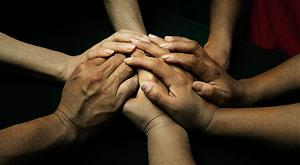(This post is one in a series on race titled “But Some of Us Are Brave.” The series includes posts from a diverse group of writers from our community. It takes a considerable amount of transparency and vulnerability for the contributors to this series to pen these posts and voice their experiences. We appreciate their courage, and we hope their willingness to be brave will spark some authentic community conversation on this sensitive and important topic. We hope you will read these posts thoughtfully and join the conversation by responding honestly and respectfully, and by sharing them with your friends and acquaintances. — ABT )
A Movement towards Color-Sightedness
My name is Amber Jekot and I’m a recovering racist. I say recovering because I confess that I have not arrived. I say recovering because I’m working towards becoming more conscious of an experience that is not, nor will ever be my own. I both admit and commit to the ongoing journey towards race consciousness, a journey that, like Lucas Land and Kelsey Miller before rightly articulated, begins with submitting myself to the position of a student. I am indebted to the friends, professors, and community members of color who have been patient enough to teach me, a patience that must have, at times, been painful.
I know something of being misunderstood, just as everyone does. Being misunderstood, misrepresented, victim to false assumptions. Yes, these are experiences common to us all, and I don’t know about you, but I can’t stand being misrepresented. I am careful to articulate my words so that my intentions are communicated in such a way that others can understand. I present myself professionally because, let’s be honest, my size isn’t proportional to my age. I choose prudently those with whom I share my pain because there is nothing worse than baring your heart to someone who doesn’t validate your experience. I can remember the emotions evoked during such times, blood rushing to my face, exasperation rising in my lungs, and the resulting inability to articulate a retort due to the magnitude of my frustration: “How can you discount something just because it was not your experience?”
Well, the things that bother us most about other people generally have their basis in what we lack within ourselves, a frustrating reality indeed. One of the lessons I have learned in my personal journey toward becoming more conscious of racism was the debunking of the colorblind myth, a lesson for which I have Dr. Sanders to thank.
Dr. Sanders, a black man whose height can only be described as tremendous, came to talk to a group of students, myself included, whose understanding of race was as small as our comparative statures. Dr. Sanders shared that while generally well-meaning, the following and often-used statement is offensive to him: “I don’t see you as a black man, I just see you as a man.” Upon first glance, perhaps this statement does seem innocent. It did for me. I scooted up in my chair with curiosity, and quizzically listened as Dr. Sanders continued: “That statement is a ridiculous as you saying to me, Alvin, I don’t see you as a tall man, I just see you as a man.” He paused, giving us the time to take in his height, and then he continued, “Are you all seriously going to tell me that you don’t see my height?”
 He went on to explain that when people choose to not see color, it often feels like people are also choosing to not see the effects that racism has on people of color. There is something about largeness that people are comfortable with; there is something about blackness that causes us to pause. Our culture doesn’t claim mottos such as size-blindedness, but claims colorblindness, a reality that divulges a discomfort implicit in the mention of race.
He went on to explain that when people choose to not see color, it often feels like people are also choosing to not see the effects that racism has on people of color. There is something about largeness that people are comfortable with; there is something about blackness that causes us to pause. Our culture doesn’t claim mottos such as size-blindedness, but claims colorblindness, a reality that divulges a discomfort implicit in the mention of race.
In claiming colorblindness it often seems that we are neglecting to acknowledge the impact of color, neglecting to acknowledge realties such as these:
People of color are overrepresented in the US penal system for illicit drug use despite the fact that “Data on illicit drug use collected by the Health and Human Services Commission has consistently shown over time that whites, African Americans, and Latinos use drugs at roughly comparable rates” (Mauer & McCalmont, 2013, p. 6; Stevenson, 2014; Alexander, 2011).
According to the CDC, “The infant mortality rate among African Americans is 2.3 times that of non-Hispanic whites.” Additionally, African American infants are 4 times more likely than non-Hispanic white infants to die due to complications related to low birthweight.”
Perhaps such a reality feels too heavy to hold. Perhaps colorblindness is our way of saying “this can’t be so”— well meaning but vision-impaired.
When I read books like Just Mercy or the New Jim Crow, books that detail breaches of justice in the US penal system, I find myself having to put these books down because the reality feels like “too much” for the present moment. When I find myself overwhelmed by stories my friends of color share with me about implicit or explicit racism, I have to “escape” from my thoughts because I can’t imagine that anyone could treat my friends with such disdain. The pain, which feels overwhelming for me, is something that I, as a white, middleclass woman, can choose to pick up and put down, to look at or keep my eyes closed. That is privilege.
 Perhaps those who are the most brave are the men and women of color who have boldly continued to share their experiences despite my own and others invalidating responses. To you, the brave, please keep speaking. The journey of the color-blind and color-sighted are indebted to your vulnerability. To those who are on the journey, however far along you are, or if perhaps you’re ready to begin the journey: let’s commit together. Instead of falling prey to white guilt, let us instead capitalize on this energy and direct it towards forward momentum. Let us speak alongside our brothers and sisters of color because this burden becomes lighter when we see and speak together. Solidarity, a good friend recently shared, means that no one or no group should have to stand alone.
Perhaps those who are the most brave are the men and women of color who have boldly continued to share their experiences despite my own and others invalidating responses. To you, the brave, please keep speaking. The journey of the color-blind and color-sighted are indebted to your vulnerability. To those who are on the journey, however far along you are, or if perhaps you’re ready to begin the journey: let’s commit together. Instead of falling prey to white guilt, let us instead capitalize on this energy and direct it towards forward momentum. Let us speak alongside our brothers and sisters of color because this burden becomes lighter when we see and speak together. Solidarity, a good friend recently shared, means that no one or no group should have to stand alone.
 Today’s Act Locally Waco blog post is by Amber Jekot. Amber is an 8-year Waco resident who works as a graduate assistant at the Texas Hunger Initiative. She is finishing a masters of social work at Baylor University and a masters of divinity at Truett Seminary. She is passionate about the intersection between food, justice, and community and has been known to take trains without knowing her destination. You may contact her via email at [email protected].
Today’s Act Locally Waco blog post is by Amber Jekot. Amber is an 8-year Waco resident who works as a graduate assistant at the Texas Hunger Initiative. She is finishing a masters of social work at Baylor University and a masters of divinity at Truett Seminary. She is passionate about the intersection between food, justice, and community and has been known to take trains without knowing her destination. You may contact her via email at [email protected].
Sources:
Alexander, M. (2011). The new Jim Crow: mass incarceration in the age of colorblindness (revised ed., p. 1). New York: New Press.
Fact Sheet: Health Disparities in Health Insurance Coverage. (2011). Retrieved from http://www.cdc.gov/minorityhealth/reports/CHDIR11/FactSheets/Insurance.pdf
Mauer, M., & McCalmont, V. (2013). A Lifetime of Punishment: The Impact of the Felony Drug Ban on Welfare Benefits. Retrieved from http://sentencingproject.org/doc/publicationscc_A%20Lifetime%20Punishment.pdf
Stevenson, B. (2014). Just mercy: a story of justice and redemption (p. 1). New York: Spiegel & Grau.
